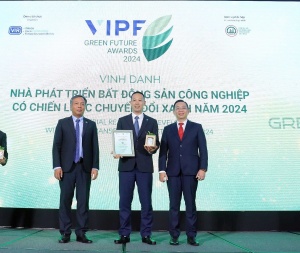Mounting pressure from Green Deal
A s the European Chamber of Commerce gears up to host the Green Economy Forum & Exhibition this week, a key topic of discussion will be the implications of the European Green Deal on Vietnam.
 |
| Dženeta Mulabegović, private sector engagement specialist at the United Nations Development Programme |
The Green Deal consists of a comprehensive set of directives designed to complement each other, prevent loopholes, and ensure market participation in the sustainability trajectory. A key part of the package are the Corporate Sustainability Reporting Directive (CSRD) and the Corporate Sustainability Due Diligence Directive (CS3D), two mandatory sustainability directives with expected far-reaching, global impact.
For Vietnamese businesses deeply connected to global supply chains, aligning with these directives is not just about compliance - it’s about maintaining competitiveness in a rapidly evolving global market, ultimately contributing to carbon neutrality and just transition efforts.
But how prepared is Vietnam for the impact of the directives? And how does this impact relate to its policy on environmental, social, and governance (ESG) and responsible business practices?
Reporting beyond traditional frameworks
The CSRD, coming into effect this year, requires in-scope companies to establish ESG policies, integrate them into an overall business strategy, and conduct reporting to facilitate transparency and accountability. Companies need to comply with closely associated European Sustainability Reporting Standards, including key ESG issues, and cross-cutting topics such as strategy and materiality assessments.
The EU’s directive goes beyond the traditional reporting frameworks, starting with its ambition to integrate sustainability efforts of companies with their financial concerns. Therefore, the CSRD mandates a fundamental shift for companies to apply a ‘double materiality’ approach, which requires reporting not only on financial materiality (effect on company value), but also on impact materiality (effect on people and the environment). Similarly, companies are required to integrate sustainability reporting into their management report, compelling them to treat it with the same importance, quality, and control as financial reporting.
Another groundbreaking feature is that the CSRD mandates a broader scope of sustainability reporting to include both direct and indirect performance across Scopes 1-3 of emissions inventory. The inclusion of mandatory reporting in Scope 3 (indirect emissions in value chain, often covering more than 80 per cent of total emissions) is particularly expansive and challenging due to the complexity of tracking emissions across extensive supply chains.
Action through due diligence
Meanwhile, the CS3D, which will take effect in 2027, requires in-scope companies to work closely with suppliers and stakeholders to identify and mitigate potential risks tied to social and environmental standards. The companies are legally mandated to implement comprehensive due diligence policies that address these risks, monitor implementation, and do what they can to remediate possible negative impacts.
A highly debated game changer is that the directive also regulates civil liability of companies for social or environmental violations in their supply chains, where affected persons can seek compensation in civil proceedings.
The CS3D focuses on company’s activities and that of its direct upstream and downstream business partners. Because of the focus on due diligence, the CS3D will likely impact procurement of companies, favouring more responsible suppliers.
Impact on Vietnam
Although intended for the European market, both directives are set to have a far-reaching impact and influence beyond the EU borders, including in Vietnam. The CSRD applies to a large scope of European companies and those listed on the EU-regulated markets, as well as a more restricted number of non-EU companies with high annual net turnover and a subsidiary branch in the European Union. It is estimated that the directive will apply to an impressive 50,000 companies across all sectors, including a considerable number of European subsidiaries that are based in Vietnam.
What makes the CSRD particularly expansive is its broad scope that covers the entire value chain of in-scope companies. This includes virtually all business relations a company might have, all internal operations, upstream and downstream activities, from raw material extraction to a product’s end-of-life. This extensive data collection will impact all suppliers in European value chains, even if they don’t fall under the CSRD themselves.
However, looking at the current level of ESG capacity, Vietnamese companies will most likely struggle to provide complex ESG data related to impact materiality and Scope 3 reporting.
Comparatively, CS3D was designed to be applied globally. The twin directive will affect directly up to 5,500 large EU and non-EU companies, covering indirectly also their upstream and downstream actions wherever they operate and source. Also, here the so-called Brussels effect is expected to be significant, impacting Vietnamese manufactures as key global suppliers whether they fall under the scope of the directive or not.
To meet the requests of the in-scope business partners, Vietnamese companies will be expected to develop risk assessments and due diligence procedures far above the current local responsible business compliance. The Brussels effect will likely be reinforced through financing, as the twin EU directives are expected to impact the lens of European investors and financial institutions when looking at investing in Vietnamese companies. While the ESG lens is already common ground among investors, the EU directives will demand a more robust process, better data, clarity, and assurance.
For Vietnamese companies seeking foreign investments from the EU, applying the CSRD and even the CS3D will be key. This will require a strong leap forward in terms of local business capacity and enabling policies.
Crucial complementarity
Whereas the CSRD implies responsible business practice as a basis for reporting, the CS3D seeks to legally ensure that the in-scope companies will truly undertake due diligence to prevent and address risks in operations and supply chain. The twin directives are designed to reinforce each other and should be applied in tandem.
The CSRD’s impact materiality can serve as a starting point for identifying risks that should be addressed in the company’s due diligence as mandated by the CS3D. Vice versa, the outcome of the due diligence can provide robust evidence and data necessary for reporting.
The European Union directives well reflect the paradigm shift that we are facing in this decade of action. For sustainability commitments to come into reach, companies need to focus on achieving real-world impact beyond ESG disclosures.
While referring to an old English proverb, we shouldn’t put the cart in front of the horse. ESG targets are necessary, but these need to be reinforced by responsible business practice integrated into business models and strategy, with evidence-based tangible outcomes.
Towards Vietnam’s Green Deal
In Vietnam, we have seen important sustainability policies and initiatives gain ground, in particular on ESG and responsible business practice. On the one hand, we have the National Green Growth Strategy and the ESG Initiative led by the Ministry of Planning and Investment, as well as the Vietnam Corporate Sustainability Forum and Index organised by the Vietnam Business Council for Sustainable Development.
On the other hand, there are the National Action Plan on Responsible Business Practice, led by the Ministry of Justice, and the Responsible Business Helpdesk, implemented by the Vietnam Chamber of Commerce and Industry. Here the horse and the cart, meaning responsible business practice and ESG, are still to be aligned with each other.
Taking inspiration from the EU, Vietnam has a lot to gain by enhancing cooperation between the relevant state agencies and aligning relevant policies towards its own Green Deal.
Stronger alignment of ESG reporting and responsible business practice will benefit Vietnam to maintain its share in European exports, supply chains and investments, and to ensure market participation in its own climate ambitions. The imminent impact of CSRD and CS3D underlines the need for a comprehensive programme on ESG and responsible business practice, to raise awareness, build business capacity, develop clear and consistent regulatory frameworks, and unlock sustainable financing.
 | Muong Thanh launches 'Go Green Save Green' strategy With the desire to make the community aware of the harmful impact of environmental pollution on the Earth, from July 20, 2023, Muong Thanh Group launched an environmental month with the message "Go Green Save Green" with a series of green activities. |
 | Honeywell teams up with The Green Solutions Group Corporation for Vietnam's first green hydrogen plant On February 21, US industrial giant Honeywell announced that it has signed a MoU with The Green Solutions Group Corporation (TGS) for the Tra Vinh Green Hydrogen Project, Vietnam's first green hydrogen plant in the Mekong Delta. |
 | Green i-Park honoured for its green transformation strategies Green i-Park, the investor of Lien Ha Thai Industrial Park (Green iP1), has been praised for its green transformation strategies at the Vietnam Industrial Property Forum's special awards event. |
What the stars mean:
★ Poor ★ ★ Promising ★★★ Good ★★★★ Very good ★★★★★ Exceptional
Related Contents
Latest News
More News
- Masan Consumer names new deputy CEO to drive foods and beverages growth (February 23, 2026 | 20:52)
- Myriad risks ahead, but ones Vietnam can confront (February 20, 2026 | 15:02)
- Vietnam making the leap into AI and semiconductors (February 20, 2026 | 09:37)
- Funding must be activated for semiconductor success (February 20, 2026 | 09:20)
- Resilience as new benchmark for smarter infrastructure (February 19, 2026 | 20:35)
- A golden time to shine within ASEAN (February 19, 2026 | 20:22)
- Vietnam’s pivotal year for advancing sustainability (February 19, 2026 | 08:44)
- Strengthening the core role of industry and trade (February 19, 2026 | 08:35)
- Future orientations for healthcare improvements (February 19, 2026 | 08:29)
- Infrastructure orientations suitable for a new chapter (February 19, 2026 | 08:15)

 Tag:
Tag:



















 Mobile Version
Mobile Version